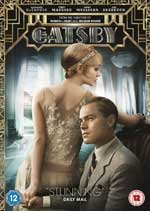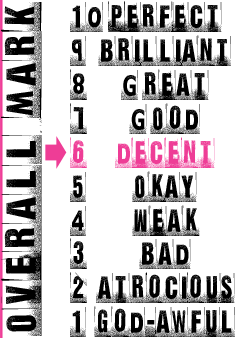
Director: Baz Luhrmann
Running Time: 136 mins
Certificate: 12
Release Date: November 11th 2013

When it was first announced that Warner Bros. was making a $100+ million version of F. Scott Fitzgerald’s The Great Gatsby, many wondered why on earth they would spend so much on a literary adaptation – which aren’t traditionally massive box office successes – even if it was directed by Baz Luhrmann. There was some logic to it though. First is that Luhrmann has had huge success taking the historical and turning it into profitable spectacle with the likes of Romeo + Juliet and Moulin Rouge. Secondly it attracted big names like Leonardo DiCaprio and Tobey Maguire.
Thirdly and perhaps most importantly, unlike most movies a film based on Gatsby isn’t just about profit in the short terms, it’s about creating something that will last for decades. Fitzgerald’s book has perhaps more claim than any other to be the ‘great American novel’ and there is probably no US school child who hasn’t had to read it at one time or another.
Despite a few attempts, such as one starring Robert Redford and Mia Farrow in the mid-70s, there’s never been a definitive version of Gatsby on screen. There’s no doubt that with generations to come still being asked to read Gatsby, a film version has the potential to be a key asset in the studio’s archive. In the end though Luhrmann’s The Great Gatsby grossed $348 million around the world on its cinema release (and that’s despite a rather mixed critical reception), making it a pretty big success right from the start and giving it a decent chance that it’ll be the version teachers will be showing their students for decades to come (as Luhrmann’s Romeo + Juliet has become for that play, overtaking the tedious Zeferelli version).
Nick Carraway (Tobey Maguire) recounts the summer he spent on Long Island in the 1920s, living in a small house right next door to the mansion of the mysterious and filthy rich Jay Gatsby (Leonardo DiCaprio). Nick is a quiet and reserved young man, but slowly gets pulled into the world of the wealthy, including his cousin Daisy (Carey Mulligan) and her husband, the philandering Tom Buchanan (Joel Edgerton).
He also gets invited to one of Gatsby’s parties, a massive, over-the-top shindig dripping with decadence, music and alcohol. The host himself is rarely seen at his own events, leading to all manner of rumours about who he is and where his money comes from, but he makes an exception to meet Nick. It turns out Gatsby once knew Daisy and harbours an all-consuming passion for her. Now he wants Nick’s help to help reintroduce them.
As you would expect, Luhrmann’s film goes big on the visuals, creating a massive, heightened version of 1920s America, with the camera swooping all over the place. It’s lush, beautifully realised and often a joy to look at. The party sequences in particular are wonderfully kinetic. While I’m still in two minds about whether giving hip-hop tracks a jazz-age makeover works, the parties themselves look amazing. However, less successful is the retelling of the story.
That said, it’s a great version for all those high school students being made to read Gatsby, as it’s kind of like the study notes version. The film sticks pretty close to the plot of the novel, but only gives a précis of the books’ complex themes and ideas. Pretty much every key theme is acknowledged, but only in the way a teacher will tell a student they exist in the novel, in the hope it’ll be enough to get the kid through his exams but without much in-depth understanding of it.
Perhaps understandably, the movie concentrates on the romantic parts of the book. It often lacks the bite of Fitzgerald, instead coming across as a more straightforward tale of love and obsession. Unfortunately it doesn’t sort out the problems with Daisy, which have always been there. She needs to be a rather delicate, self-obsessed and selfish woman, but yet we also need to understand exactly why Gatsby would be so infatuated with her. Thematically they’re both important sides of her, but while the film gets across how 1920s expectations have somewhat crushed her, like the book it can’t really explain why men want her so much, other than her beauty. Throughout Fitzgerald’s work, he tends to completely objectify woman and has difficulty seeing them as being as real as men. It’s a shame the film couldn’t have at least addressed that a little.
It’s a pretty good watch, but I almost wish I didn’t know the book so well, as I reckon if I had come into the film cold it’s a movie I could have really loved. It’s epic and yet never forgets its characters and there’s undoubtedly an emotional heart to it. However if you know the novel, it becomes frustrating that you’re very aware that it’s skimming over the top of something much more interesting and complex.
Even those who don’t know the book may sometimes feel they’re not being given the whole story. This is most evident in the relationship between Nick and Gatsby. As Luhrmann says in his introductions to the deleted scenes on the disc, this is one of the main keys to the movie – that Nick is recounting this story because being drawn into Gatsby’s world changed his life – but the film can’t decide want this means. Like the aforementioned school teacher, it works its way through the possibilities – such as the allure of money and decadence, that Gatsby is someone Nick would like to be in his fantasies, or that he’s gay and has fallen in love with the man – but it never decides which one it is, or whether all of these can be true.
There are moments when it certainly comes across like an unrequited gay romance, but other times when this seems to be deliberately refuted. I can’t help but feel Luhrmann perhaps would have liked to make this more explicit, but with people moaning about him turning Gatsby into a camp extravaganza even before he started filming, he was perhaps convinced to tone this down.
The deleted scenes on the disc are definitely worth a look, as they cover some of the well-known bits of the book that didn’t appear in the final film. Many of these were filmed, such as Gatsby’s famous line about Daisy that her ‘voice is full of money’, as well as many of the scenes right at the end of the story, which are important in the book to fully inform us about who Gatsby is, but which Luhrmann felt detracted from the core of bringing things back to Gatsby and Nick’s relationship. Personally I think it would have been worth keeping some of them, but then, it’s not my choice!
Overall Verdict: If you don’t know the book, there’s a huge amount to enjoy about Baz Luhrmann’s extravagant, heightened take on F. Scott Fitzgerald’s classic, but if you do, you may be frustrated by how it hints at all the themes and complexities, without either going into any real depth or making any decisions about what it wants to say about them.
Reviewer: Tim Isaac





Leave a Reply (if comment does not appear immediately, it may have been held for moderation)